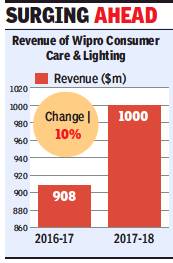Wipro
This is a collection of articles archived for the excellence of their content. |
Contents |
Facebook projects
Autonomous photo recognition
May 7, 2019: The Times of India
Who's checking your Facebook photos? Wipro and its workers
NEW DELHI: We got news for you. A team of over 250 overworked techies in Hyderabad have been parsing through your Facebook photos, categorising them into five "dimensions" and trying to figure out why you posted those pictures — was it a celebration, a joke or a major event in your life? These contract workers have been going through Facebook photos posted since 2014, and over the past one year have been labelling them — the first step towards an autonomous photo recognition.
Details of the project were revealed by a Reuters report, which gleaned the information from multiple employees at Wipro, the outsourcing firm that is working on behalf of Facebook.
The report says Facebook later confirmed many details of the project. Wipro declined to comment and referred all questions to Facebook. The Wipro work is among about 200 content labelling projects that Facebook has at any time, employing thousands of people globally, Facebook says. The Wipro workers said they gain a window into the lives of people as they view a vacation photo or a post memorialising a deceased family member.
Though content labelling projects such as these are often anonymised — photos are stripped of identifying information of the owner — Facebook acknowledged that some posts, including screenshots and those with comments, may include user names.
So why does Facebook need to do this? Well, the first step to creating an artificial intelligence capable of recognising photos is labelling them — the machine first needs a collection of cat photos labelled cat to recognise future cat photos. But Facebook (and also Google and others) have AI capable of doing this.
But the Wipro project suggests Facebook could be working on an AI that could recognise the "context" of a photo, not just the person or object in it — a happy photo, a sad photo and such. To train the software on this, it first needs tranches of photos with correct labelling.
Thankfully, you have uploaded all those photos on Facebook. And, contract workers are available to sit through and stare at all those random photos.
Facebook confirmed labellers in Timisoara, Romania and Manila, the Philippines are involved in the same project. It said its analysis is ongoing and thus could not provide resulting product decisions. Now go on and post an angry selfie on Facebook!
Revenue
2017>2018: consumer business revenue is $1bn
Wipro consumer biz hits $1bn in revenue, May 4, 2018: The Times of India

From: Wipro consumer biz hits $1bn in revenue, May 4, 2018: The Times of India
SE Asia, Domestic Portfolio Boost Numbers
Wipro Consumer Care and Lighting (WCCL), part of the unlisted entity Wipro Enterprises, has entered the $1-billion-dollar revenue club. The company did Rs 6,630 crore, or just about $1 billion, in 2017-18. That’s a growth of 10% from last year, when it did $908 million.
WCCL CEO Vineet Agrawal had told TOI in February that a stronger foothold in Malaysia, Vietnam and Indonesia, and the continued gains of the Indian portfolio led by the Santoor and Chandrika brands have fuelled growth for the division. WCCL gets 50% of its revenue from international markets. Malaysia contributes a little over $145 million, and China $120 million. Indonesia, which had a sluggish first half, bounced back with a double-digit growth in the second half of last year, the company said in a statement on Thursday.
Rival Hindustan Unilever does a revenue of about $5 billion in India alone. ITC does $9.4 billion, but a lot of that still comes from cigarettes. Patanjali, which is just over ten years old, did a revenue of almost $1.5 billion in 2016-17 and was looking at doing $3 billion in 2017-18. Wipro’s consumer business was founded by the Premji family in 1945, when it sold vegetable oils. But in the 1980s, the focus became IT hardware and software. The consumer business was given renewed focus in the past two decades.
WCCL has over the years spent around $650 million on acquisitions, including $250 million that it spent on buying Singapore’s personal care products maker Unza Holdings in 2007. Two years ago, it bought Zhongshan Ma Er to get a strong foothold in the Guangdong (China) market.
Agrawal said the key driver of growth this year was the company’s ability to handle the GST transition in India. “We proactively engaged with our distributors and partners and clarified their doubts about GST. This gave us momentum in June-July 2017, leading to 18% growth in the India business in FY18. Distribution also improved especially post-GST implementation. Santoor and Garnet LED brands did particularly well,” he said.
Among its brands, Santoor is the biggest with a turnover of about $300 million, followed by female toiletry brand Enchanteur at $150 million. It has several $50-million plus brands including premium toiletry brand Yardley, male toiletry brand Romano, skincare brand Bio Essence, Halal skincare brand Safi and Garnett LEDs.
Last year, WCCL invested close to Rs 50 crore in New Delhi-based online consumer product firm Happily Unmarried to pick up about 20% stake.
To build the homecare portfolio, the company has test-marketed the Giffy brand of dish wash liquid in select states in India. In India, Safewash Liquid detergent intends to create newer consumption opportunities in the household laundry segment.